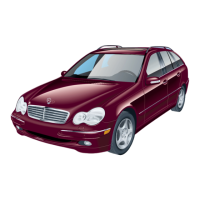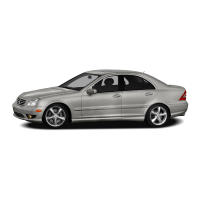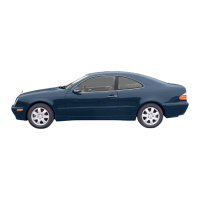
Do you have a question about the Mercedes-Benz 2002 C 230 Kompressor and is the answer not in the manual?
| Brand | Mercedes-Benz |
|---|---|
| Model | 2002 C 230 Kompressor |
| Category | Automobile |
| Language | English |
Details warranties covering your Mercedes-Benz, including limited, emission, and enforcement laws.
Provides contact information and details for the Mercedes-Benz Roadside Assistance Program.
Overview of all controls operated from the driver's seat.
Details controls on the driver's door panel, including memory and window switches.
Identifies controls located in the overhead console, such as lighting and Tele Aid.
Details various controls and switches located on the dashboard.
Locates and describes controls in the center console, including climate and locking switches.
Describes electronic keys with remote controls and mechanical keys for vehicle access.
Covers operation of central locking via remote control, switches, and keys.
Covers seat belts, airbags, and integrated restraint systems for occupant safety.
Provides guidance on proper installation and use of child restraint systems, including LATCH.
Details how to adjust the steering wheel manually for optimal driving position.
Explains electric adjustment of steering wheel for position and height.
Covers manual adjustment and automatic antiglare function of inside and outside mirrors.
Details adjustment, heating, and memory functions for exterior mirrors.
Explains how to store and recall seat, steering wheel, and mirror positions.
Diagram and labels for the main instrument cluster gauges and displays.
Explains the meaning of various indicator and warning lamps in the instrument cluster.
Illustrates and labels controls on the multifunction steering wheel for accessing vehicle systems.
Details the trip odometer, main odometer, and how to access related submenus.
Provides tips and descriptions for using the Mercedes-Benz audio and telephone systems.
Explains telephone book, redialing, and call handling features.
Describes the status and operation of the navigation system.
Explains how to use the trip computer for distance, time, speed, and fuel consumption.
Details how malfunction and warning messages are displayed and stored in memory.
Guides users through customizing instrument cluster, lighting, vehicle, and convenience settings.
Describes manual and automatic modes for headlamps, parking, and fog lamps.
Explains manual and automatic headlamp operation, including daytime running lights.
Details how locator lighting activates exterior lamps after unlocking.
Covers operation of low/high beams, turn signals, and hazard flashers.
General information on system readiness, operation, and temperature settings.
Explains automatic cooling/heating based on outside temp and selected interior temp.
Details how to activate and use the defrosting function for clear visibility.
Explains how to select and switch air recirculation, including convenience window functions.
Provides tips and descriptions for using the Mercedes-Benz audio and telephone systems.
Emphasizes driver focus and cautions against alterations to electronic components.
Identifies and describes buttons, keys, and display elements of the audio unit.
Explains how to increase or decrease audio volume using the control knob.
Details adjustment of Bass, Treble, Fader, and Balance functions.
Covers selecting radio mode, tuning bands, and station search functions.
Explains playing CDs, track selection, and handling temperature effects.
Details playing cassettes, track selection, fast forward/reverse, and scanning.
Explains how to select and call entries from the telephone book.
Covers manual and automatic redialing of the last dialed number.
Procedure for initiating a call after selecting a number or name.
Instructions for making emergency calls, including stored numbers and network availability.
Details manual operation, express opening/closing, and automatic reversal features.
Explains manual and automatic operation of the sunshade for the panorama roof.
Details opening, closing, raising, and lowering the panorama roof.
Covers operation of rear and front interior lights, including automatic functions.
Explains how to open, lock, and unlock the glove box.
Step-by-step guide to folding the rear seat bench forward for increased cargo space.
Instructions on how to raise the backrest until it locks securely in its upright position.
Explains how to set, accelerate, decelerate, cancel, and resume cruise control speed.
Details how BAS maximizes braking capability during emergency maneuvers.
Explains ABS function, pedal feel, and emergency braking procedures.
Describes ESP's role in enhancing control, reducing wheel spin, and counteracting over/understeer.
Explains general information and specific malfunction lamps in the instrument cluster.
Details the check engine malfunction indicator lamp and diagnostic connector.
Explains the meaning of the brake warning lamp and fluid level issues.
Describes the SRS indicator lamp function and what a malfunction indicates.
Indicates low fuel level and prompts to visit a fuel station.
Details when the ABS malfunction lamp illuminates and what it indicates.
Explains the ESP warning lamp and its meaning when illuminated.
Describes the warning sound and lamp for unfastened seat belts.
Explains the function of the airbag off indicator for child seats.
Details categories of messages, their priority, and clearing procedures.
Indicates incomplete information from the engine control unit, possibly affecting gauges.
Indicates failure in multiple display systems, potentially affecting vehicle functions.
Indicates a malfunction possibly due to a broken poly-V-belt, requiring immediate repair.
Explains ABS malfunction indication and potential impact on other systems.
Warns of low brake fluid, indicating potential leaks or worn pads.
Indicates when the parking brake needs to be engaged or released.
Alerts to seat belt system issues and prompts to fasten seat belts.
Indicates a malfunction in the light sensor affecting automatic headlamp operation.
Alerts the driver when a door is detected as being open.
Alerts the driver when the trunk lid is not properly closed.
Alerts the driver when the hood is not properly closed.
Indicates if the telephone system is not available or not equipped.
Alerts to Tele Aid system malfunctions, requiring workshop check.
Indicates low washer fluid level, requiring refill.
Alerts to issues with the airbag or seat belt systems, requiring workshop check.
Indicates a potential issue with the electronic key, possibly requiring replacement.
Details the location and removal of the first aid kit from the trunk.
Explains fuse functions, replacement, and locations of fuse boxes.
Provides safety instructions for opening/closing the hood and warnings about moving parts.
Details how to check engine oil level via dipstick or multifunction display.
Instructs on checking coolant level, adding coolant, and safety warnings.
Covers refilling the reservoir and fluid mixing ratios for washer systems.
Details removal, storage, and usage of the spare wheel and associated tools.
Describes the location and removal of the jack, pump, and other tools.
Provides recommendations for replacing tires and rims, including size and type.
Explains the procedure and benefits of rotating wheels for even tire wear.
Step-by-step guide to inflating the spare tire using the supplied air pump.
Details how to check and adjust tire pressure, considering temperature changes.
Covers battery replacement, charging, connection, and safety precautions.
Step-by-step guide for jump starting a vehicle with jumper cables.
Provides guidelines for proper towing methods and restrictions, especially for automatic transmissions.
Covers headlamp adjustment and bulb replacement procedures.
Step-by-step instructions for replacing wiper blade inserts safely.
Provides guidelines for mounting roof racks, emphasizing approved types.
Provides warnings and instructions for safe and effective vehicle cleaning.
Details proper washing techniques, detergent use, and drying.
Provides instructions for cleaning seat belts and warnings about weakening them.
Provides detailed engine specifications like model, bore, stroke, displacement, and output.
Lists rim sizes, wheel offsets, and tire sizes for different models.
Lists capacities for engine oil, transmission fluid, brake fluid, coolant, and fuel tank.
Details brake fluid properties, moisture absorption, and replacement intervals.
Specifies premium unleaded gasoline requirements and precautions for using lower octane fuel.
Explains coolant composition, freeze/boiling protection, and replacement intervals.
Explains tire grading for treadwear, traction, and temperature.
Defines traction grades (AA, A, B, C) and their meaning for stopping on wet pavement.
Explains temperature grades (A, B, C) related to heat resistance and dissipation.









